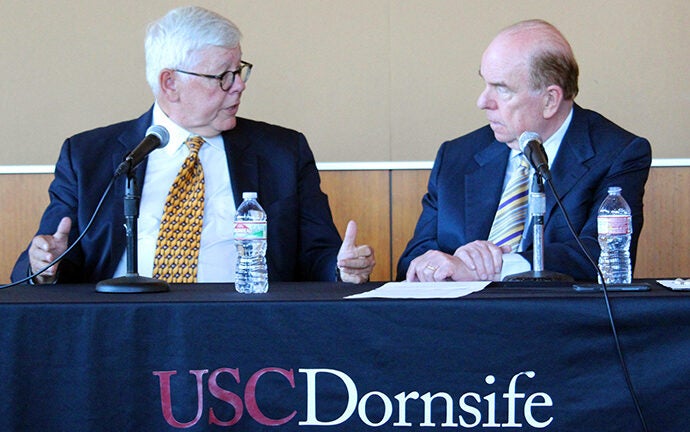
Former NRA President discusses the state of conservative politics in the age of Trump
As part of USC Dornsife’s Political Conversations series, David Keene, former president of the National Rifle Association (NRA), former head of the American Conservative Union and editor-at-large at the conservative daily newspaper The Washington Times, answered questions from Robert Shrum, Carmen H. and Louis Warschaw Chair in Practical Politics and director of the Jesse M. Unruh Institute of Politics. The event was held in partnership with the USC Political Student Assembly and the Department of Political Science.
Keene and Shrum spoke at the Ronald Tutor Campus Center on USC’s University Park campus on Sept. 18. Their conversation ranged over diverse topics including gun control and conservative politics in the Trump era.
Keene is the latest speaker to visit USC under the auspices of the Political Conversations discussion series, which features speakers from left, right and center of the political spectrum. The events are part of a tradition at the university of exposing students to diverse opinions and perspectives.
The changing political landscape
Shrum, professor of the practice of practical politics, kicked off the discussion by asking Keene how conservative politics have changed since President Reagan.
“Reagan is the conservative icon, yet he made a deal with Tip O’Neil to save social security; he made a deal with Ted Kennedy on immigration reform that included a path to citizenship. How would that go over in today’s Republican Party?” Shrum asked. “Do you hold out much hope in Washington for the kind of politics [they] … represented?”
Keene replied that he didn’t, first because the parties have changed.
“When I worked on the Hill, there were conservative Democrats and there were liberal Republicans. … Conservatives and liberals had different approaches to problem solving, but there was usually an agreement on what the problems were. Today, conservatives and liberals live on different planets. … They don’t even agree on what the problems are, never mind the solutions.”
One of the downsides of modern technology, Keene said, is talking only to people with similar views. “It’s very difficult in those circumstances to come to the kinds of agreements that you could come to. … Even the Senate is not the collegial body that it was years ago.”
The jury is out
Noting that Keene has spent a lot of time on prison reform and had been opposed to much of the Patriot Act, Shrum asked him what he thought of President Donald Trump.
Keene said he thought the jury was out, but that Trump, whether or not his actions are well thought out, is keeping his promise to challenge the establishment.
“It’s clear that as a novice president, he’s not yet figured out how to deal with Congress. … From the cabinet standpoint, I think he’s done a pretty good job. … He’s got a lot of capable people. … Whether he’s going to be successful or not, is yet to be seen.”
Asked by an audience member about the current political chasm separating right and left and how to achieve a middle ground, Keene replied that the answer lay in education and out-reach.
“That doesn’t mean agreement,” he said. “You can sit down with people you don’t agree with on fundamental issues and you can still work out 70 percent of your problems, but you have to sit down. You have to be able to listen; you have to be able to talk across the table. That has to be re-established because that’s not taking place very much in our society anymore.”
Gun control
Shrum said that the NRA often accuses candidates, especially Democrats, of wanting to destroy the Second Amendment and asked Keene if, in his mind, that was literally true.
Keene, the author of a recent book with Thomas Mason on America’s gun control debate, Shall Not Be Infringed: The New Assaults on Your Second Amendment, responded in the affirmative. Hillary Clinton, he said, had argued that the Second Amendment did not guarantee the right of an individual citizen to own firearms.
“There are people who believe in a sort of quasi-religious way that … you could snap your fingers and there’d be no more firearms, … that we would live in a utopia [without] crime,” Keene asserted. “That’s not the case, and we know that now. The empirical evidence supports the positions the NRA takes.”
Keene noted that legalized concealed-carry has grown from three states in 1980 to 50 states in 2017.
Shrum questioned why that was a good thing. Keene said: First, it was a question of Constitutional rights, and second, most recent NRA growth has been among women joining for self-defense. Keene also asserted that it has resulted in a drop in violent crime.
Research on this issue varies widely, however, and research into decades of crime data conducted at Stanford University and published by the National Bureau of Economic Research shows that states that have adopted right-to-carry laws experienced a 13 to 15 percent increase in violent crime in the 10 years following their enactment.
Shrum closed the event by thanking Keene. While noting those thanks did not constitute an endorsement of the former NRA president’s convictions, Shrum stressed that having Keene come to speak at USC had been a positive occurrence.
“It’s great that on this campus we can listen to people of widely different views,” Shrum said. “We can have strong opinions and we model what should be civil dialogue.”